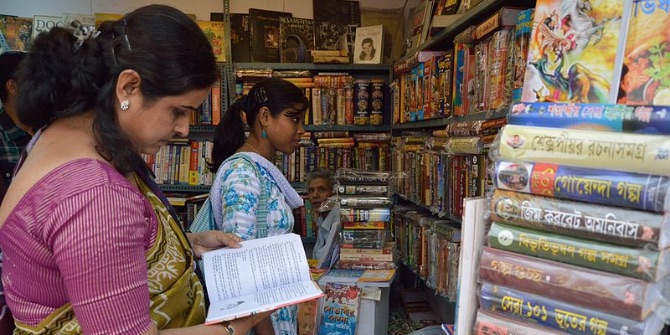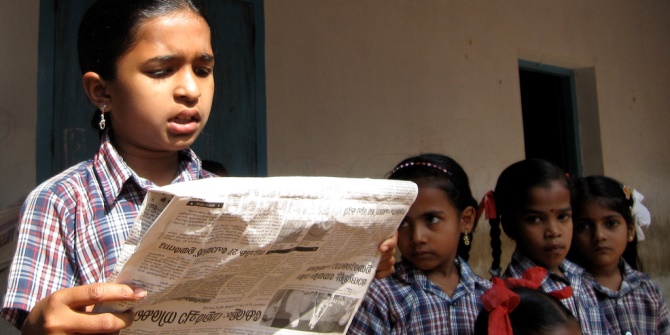 Amitav Ghosh recently visited LSE to talk about his latest book Flood of Fire. Ankita Mukhopadhyay attended the event and here offers an overview of the themes highlighted in the readings and through the Q&A session.
Amitav Ghosh recently visited LSE to talk about his latest book Flood of Fire. Ankita Mukhopadhyay attended the event and here offers an overview of the themes highlighted in the readings and through the Q&A session.
On 29 March, braving the rain and willingly sacrificing their short lunch hour, students flocked to listen to Amitav Ghosh’s talk about his new book, Flood of Fire. Dr Mukulika Banerjee, Associate Professor in the Anthropology department of LSE and Director of LSE’s new South Asia Centre, introduced Dr Ghosh. Banerjee noted it was a personal pleasure to invite Amitav Ghosh to LSE, as she credited her initial training in Social Anthropology to Ghosh, who taught her at the Delhi School of Economics. She described Amitav Ghosh as a historian and anthropologist, not only by training but because his novels have a historian’s eye for detail and an anthropologist’s empathy for the voice of the ‘other’.
The main presentation began with a short introductory video shot in Calcutta, where the book begins. Flood and Fire is the third in the Ibis Trilogy and based on a forgotten war – the 1840-1842 First Opium War. Colonial India’s largest export was opium, the largest importer of this opium was China and Britain’s East India Company was the greatest beneficiary of this trade. The trade drew a large number of Chinese to Calcutta and by the 18th century the capital of the Raj had a thriving Chinese community. The book features members of this community and other characters from the first and second parts of the trilogy, Sea of Poppies and River of Smoke. Ghosh described his story as about connection – the connection of people through memories, which are memories in turn of a history of mutual destruction.
One of the powerful things about Ghosh’s novels are the real events and characters he highlights through fictional contexts. He strives to speak for the subaltern, the unheard, and especially those who have left virtually no residue in historical records. It’s a challenge to talk about these people, because it often means writing about groups and it is hard to make the reader grasp multiple voices, as opposed to just those of a few central characters.
Ghosh, in his charismatic style, chose to read a selection of passages from his book, to give readers a sense of the book. The readings highlighted how the rich and interconnected histories are woven into his writing. For example, Ghosh described his main character, Neel Rattan Halder, finding himself in a translation office of Commissioner Lin, one of the main people in China who precipitated the Opium War. What readers might not realise is that both the translation bureau and Commissioner Lin actually existed, as did Halder’s friend, Compton, a man that Ghosh stumbled across while researching the book in the Greenwich Maritime Museum. In the passage that was read, Compton vents his anger at the manipulative English translations of Chinese words. Words that in Chinese meant, “foreigner” were translated as “barbarian”, seeking to imply the British deliberately mistranslated the word so they could pick a fight with the Chinese. In the words of Ghosh, “they want war, and they are looking for excuses, even a word would do.”

After the reading of several more passages – including a witty sex scene which expertly drew on elaborate 19th century Hindustani phrases to communicate the intimacy of the two characters – the floor was opened to questions. One of the questions that sprang from the amusing wordplay showcased in the readings was how he managed to use the vernacular so effectively in his books. Ghosh answered that it is impossible to describe life in India without it. He explained that a lot of Hindustani words like ‘namaz’ and ‘masjid’ made their way into the Oxford English dictionary and that there was extensive intermingling of Hindustani with English during the colonial period. Young British children looked after by Indian ayahs often spoke more Hindi than English in their early years – for example, Rudyard Kipling supposedly did not speak English until the age of six. In fact, a lot of Asian and African words that were removed from Webster and Oxford English dictionaries when they were standardised have lived on in English as slang. Ghosh described how he likes to annoy his children when the call him “dude”, by asking them, “Why are you using this 18th century African word?” (This elicited another round of laughter and applause from the audience).
When talking about the inspiration for his books and how they are influenced by his own experience, Ghosh described his books as being about departures. The trilogy started with the central character Deeti’s departure in the Sea of Poppies, and Flood of Fire deals with the departures of Indian soldiers to fight for Britain in China (among others). Ghosh’s own life has been characterised by departures. He described his family as originally hailing from Bangladesh. Many years ago, he visited his ancestral village with his father, only to find it submerged, because a river had changed its course. He described his family as one of the first ‘ecological refugees’, forced to leave and prevented by the elements from returning. Ghosh admitted his life experiences and his re-visitation of his own heritage have strongly influenced his writing.
On being asked how he fleshes out his characters, Ghosh said he first tries to get a vivid idea of “who and how” his characters are. This task is made tougher because his accounts are mostly about indentured workers in Calcutta between 1835- 1920. As far as we know, none of these labourers wrote memoirs, despite the fact there were millions of them. It is not that Indians don’t like story-telling – he described story-telling as “the national project of India”. But what is interesting about this period is that there is what Ghosh referred to as the “withdrawal of the Indian voice”. This was a trend that Mahatma Gandhi also identified and spoke out against, arguing that it leads to history being written in colonial terms.
The discussion culminated with questions on opium trade and India’s historical relationship with China. Ghosh pointed to the complex – even taboo – history behind opium. While it was a bigger item of trade than Indigo, there has been a systematic suppression of its historical importance. Opium was the foundation of the colonial economy, and the growth of the British Raj saw the entire trade of India re-oriented to focus on China. The wealthiest British traders made their profits from business with China and opium money was used to fund enterprise and development around the world. Ghosh highlighted Franklin D. Roosevelt’s vast inheritance came from opium trade, while Brown University is endowed with opium money. These connections to the poppy trade are now seen as embarrassing – after all, would Britain like to admit to creating the first narcotics state? As a result, the history of the opium trade has over the years been supressed or forgotten.
Over the course of the event, Amitav Ghosh kindled an interest in his new novel amongst his fans and inspired those new to his work to read his Ibis Trilogy and discover his numerous, diverse and powerfully real characters. He also invoked a new interest about the opium trade, colonial history, and the untold narratives of China and British India.
Note: This article gives the views of the author, and not the position of the South Asia @ LSE blog, nor of the London School of Economics. Please read our comments policy before posting.
About the Authors
 Ankita Mukhopadhyay is currently studying for an MSc in History of International Relations at LSE. She completed her undergraduate degree in History (Hons.) from Lady Shri Ram College , New Delhi and tweets @muk_ankita.
Ankita Mukhopadhyay is currently studying for an MSc in History of International Relations at LSE. She completed her undergraduate degree in History (Hons.) from Lady Shri Ram College , New Delhi and tweets @muk_ankita.







